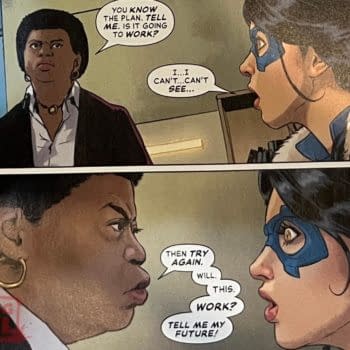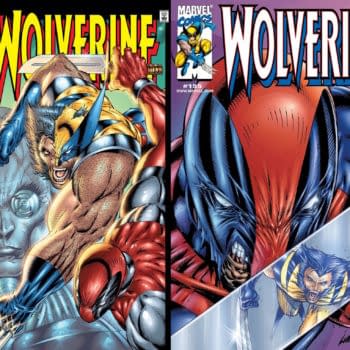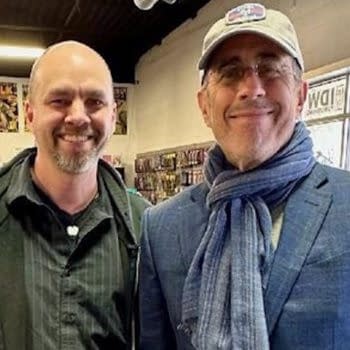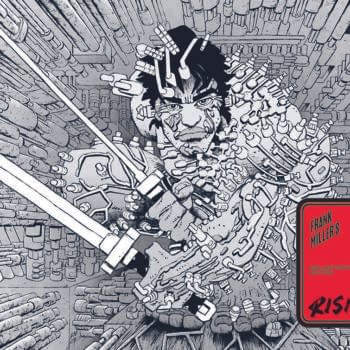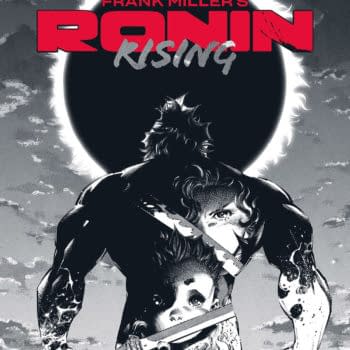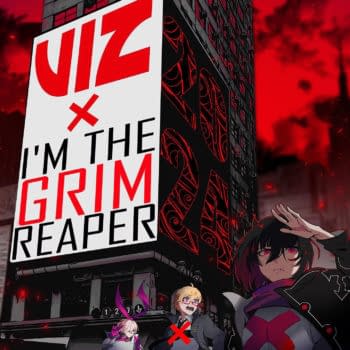Posted in: Comics | Tagged: bill willingham, comic, dc, fables, fairest, politics, vertigo
Bill Willingham On Sex, Death And Politics

Bill Willingham is enjoying runaway success with his series, Fables, which has just recently debuted a new spin-off series, Fairest. He is also something of an anomaly, being one of the few outspokenly conservative creators in the industry. So, while talking to Willingham about his new project, I took to opportunity to get him to weigh-in on a debate that's been raging on Bleeding Cool recently.
I wanted to start just by asking how you are. I heard you were in the Mayo Clinic for a spell last year.
I was in the Mayo Clinic. I had a very small problem with a heart arrhythmia. It's one of those things that it doesn't cause too many problems and can be easily fixed if you recognize it early; if you go to the doctor early. I didn't. I thought I was just coming down with a flu or a bug or something, until the heart arrhythmia started to affect other things like my blood pressure. I let it go on far too long — stupidly, weeks — before seeing the doctor and the doctor said to me, "You should be dead! But we'll put you in the hospital now."
They got my blood pressure down and took care of all the side effects but, for the heart arrhythmia, all they did was take me in for a 30-minute procedure where they zap your heart, and it resets it, and everything's fine. If I had done that right away, I would have been in and out the same day, with no hospital stay. I just happened to have been silly by thinking, "Ah, it's probably just a bug."
I'm fine now!
So, what condition did you have? Was it a form of tachycardia?
No, it was in that range, but another category of that. Just basically all my chambers marching to the beat of their own drummer, and not co-operating the way they should. But, at least, it was an easy fix.
Well, that's great news. It means we can talk about your work now. [Laughter] Fables has spun-off two side-projects recently, and you're writing one of these — Fairest — which debuted earlier this month. Can you tell us what your plans are for the series?
My plans for the series — in a general way — are that Fairest is Fables in every definition of the term, but since Fables concentrates more on the larger, more epic stories, in Fairest, we'll take individual Fables characters and give them their own story. They could be very modest stories, or ones with larger consequences for the main series, but at least concentrating on one or two characters. The conceit is that, since there are so many Fables characters who are "the fairest in all the land" from their original stories, let's just explore that: the beautiful people. A lot of the female characters, and even a few of the male characters — you know, if Prince Charming weren't dead, he'd be in the cast of Fairest, because he's so damn pretty and he knows it.

Have you got a larger narrative arc that will run through the series?
It's going to be more focused on the shorter stories about the characters, but of course we will tie-in with the Fables saga, which does have a larger narrative arc, and if Jack of Fables was any indication, Fairest may indeed generate its own larger arc, even if I don't have it planned that way, because stories have a tendency to do that. We're certainly already introducing new characters that may become regulars in the series, and perhaps guest over in Fables. A serial story is often the most unstable thing in the world — you sneeze, and a large epic will break out. I think larger epic arcs just impose themselves, whether you intend for them to do that or not.
Fables itself has moved away from its initial trajectory — after issue 75, when that first arc had been resolved — it now seems like you're becoming more experimental in your approach to the series now. Have you got plans to continue the series indefinitely? It feels a little like you're trying to search for an endpoint.
Well, there are two aspects to that — yes, we're getting a little more experimental with Fables, but not in the sense of changing things up. I think Fables has always been based on the idea of not repeating ourselves and telling the same story twice. Obviously there are some universal things, though — people are always going to fall in love, and readers like a good love story and, as a writer, I like writing a good love story. That's going to happen, but hopefully they all don't play out the same way. There's not going to be a formula. In Fairest, hopefully, there will also not be a formula, other than what I already stated about arcs of individual characters.
The endpoint…the endpoint of Fables… I have several possible final stories in mind. If I were to do it right, if I were to plan my life perfectly, it would be that the last Fables story is written just before I die on the table. I will have finally wrapped-up all the plotlines, I've answered all the questions, I've said everything I want to say, and I'm done. Then — bang — the big one gets me and it's lights-out. If that turns out to be the case, I would like to hope that it's not too soon down the road and we get another hundred issues. So, to whoever is running things up there: that's my wish.
Wow — that's pretty apocalyptic, but yet somehow doesn't surprise me. [Laughter] And I'm glad you brought up your beliefs, because digging deeper into Fables, it's clear that your personal worldview is innately tied to the series. Now, I don't know if you follow Bleeding Cool, and have seen some of the recent discussions —
From time to time.
Oh, great. I don't know if you've seen the heated discussions about politics in comics — whether a writer's politics can harm a comic — harm its sales — or whether it's a necessary part of storytelling. Now, you're fairly unique in that you're one of the few conservative writers in the industry at the moment. I'm sure you have some thoughts on the matter about what role your own personal politics have to play in storytelling.
Well, first of all, I'm glad you agree that it is rare for a person in our business to be conservative, as opposed to liberal. Politics is vast in comics — every writer's politics gets in there, here and there. I think why mine stand out is that it's not the politics the greater readership, or the greater core comic community, is used to seeing. I think the reason that every time there seems to be some hint of politics in my books that it's like, "Oh my God — he's doing politics!" but you don't get upset about the books you love, even though they're rife with politics too. It's because that's the sea you swim in, so you're not noticing it, just like the fish don't notice the sea — it's normal. It is maybe fortunate, or maybe unfortunate that everyone thinks their personal laws are the laws of nature. Meaning, "If nature agrees with what I believe in, then things are going great, but if there's a diversion then — urgh — I need to stamp that out."
So, yes, my politics do enter into my stories, because on one level, one's politics are the things you care about. If you're not writing stories about the things you care about, there's a real technical term for that…what is it…. Oh — a hack! [Laughter] If you're just dashing off what you think will sell. If you're writing stories about what you care about, you're at least trying to make meaningful significant stories.
Now, that said, all you people who are reading this now are getting upset, "Oh, so he's saying it's OK to be political." No — I don't think that my job is to change the politics of anybody. My job is to entertain the reader in hopefully a convincing and serious way — not "serious" as in there's no jokes, just in that the subjects matter — in a way that doesn't leave them feeling cheated. I don't want people to feel that they've paid too much for not enough story. That's my job.
I don't want to convert anyone with my politics. Someone once said — and I wish I could remember who said this, because it's perfectly worded — that the purpose of art is not to tell your reader what to do, it's to show your reader who he is. What I mean by that is: Let's start a dialogue that's going to take place entirely in your head. Here's a character you hate; we hate what he does — or a character you think is noble and endearing. That's the story that takes place within you and that's under your control. Part of our job is just to throw provocative things your way — you are never going to have that dialogue fully is all you see in the story is representations of what you already believe. So, to that extent, politics is vital to the story.
You never feel then, that your writing becomes a polemic? You don't actively want to impose your beliefs on the readers?
No — and let's clarify something: If I were even to use Fables as a political rag and say, "This is what I believe!" That's not imposing anything on anyone. I may try to convince you, but I can't force you to do anything — there's no imposition there. If I say, "This is what I believe and, if you don't, we're coming to your house later," then there's imposing of beliefs… but that's never going to happen. If you disagree: disagree. You are in control of the ultimate story that is taking place, and isn't it fun that we're shaking you up every once in a while.
Talking about shaking things up — looking over your career trajectory, it has been interesting, and you've done some very interesting and unconventional works, especially some of the things you did for Fantagraphics. I think it's clear to see that Coventry was kind of your trial run for Fables —
Sure.
— but how did Ironwood come about? That seemed like a very left-field project for you.
You were very polite there, asking about my "interesting career trajectory" — Ladies and Gentleman, what he meant and was too polite to say, is that in the first two decades of my career, I would shoot myself in the foot often! I was not the most reliable man with deadlines, not the most to agreeable man with getting my way in certain things. In any case, Ironwood was a case where not too many people were picking up the phone when I was calling looking for work. Ironwood started almost accidentally when a friend of mine was trying to get a book in with this new company called Eros, which turned out to be Fantagraphics Books. It was basically porn comics — or "erotica" depending on your perspective — I'll call it "porn," you call it "erotica". Po-tay-to, po-tah-to.
They weren't quite sure that they wanted to do the book, but then he mentioned that he was friends with me, and they said, "If you can get Bill to do your covers, then we got a deal." So, he brought me in and said that I would do his covers.
Is this Time Wankers?
This was Tiiiiime Waaaaankers — the greatest title for a porn comic probably in existence!
Ah, I'm partial to Anal Intruders from Uranus myself.
Well, there you go! [Laughter] So, we agreed to do this on the phone, and just before we signed, they asked me, "Do you want to do something for us?" So, I thought, "what the hell!" I had often wondered whether you could do an adult comic and have an interesting story as well that held together. The answer I found was: probably not. I tried! Ironwood was 11 issues and some people liked the story, and there are aspects of the story I like, but the formula — the implied contract — that you owe the average reader one arousal, or potential arousal, per issue overshadowed everything else. "This is a nice story, but get some dirty stuff in there, for God's sake!" And I was running out of ideas — I guess I'm a boring guy, because I was running out of ideas on how to get people off. I didn't just want to do the same thing over and over again, because that would just be…creepy. So, I was running out of ideas, and I was thinking that it was a failed experiment with a few things that I'm still fond of within it. Yes, that was certainly an interesting time in my career.
That was also an interesting time for Fantagraphics, do you have any interesting stories about those days?
While I was working on Ironwood, I was actually sharing a house with Gary Groth but — friendship rules — the hijinks that we got up to will die with me. Sharing a house with Gary was a lot like living in a frat house dialed up to 11. Let me just say that.
OK, 'nuff said. You were talking about how Fables is your life's work, and you'll hopefully write it until you die. Do you have any intentions to break off into doing more indie projects, or other work that's a little more experimental?
Well, sure. Fables I want to keep doing for as long, but that doesn't use up all my time. With other things, I'm going to concentrate on comics and prose ideas where I don't have to convince a publisher that this is something they should want to do. I'm really frustrated with the "No — this will be a good story — trust me" aspect. Since Fables is a success, and it's something I'm beginning to believe I can rely on, any other projects will be a case of me doing totally what I want to do, and then go looking for a publisher. I don't want to have to convince someone in advance — I don't want to offer someone an idea and sell that, I want to be able to offer them a finished work, so it's completely my own thing. I've done a little too much of working on other people's properties, just because I have friends in the industry, and I pick up these projects because we're friends. I'd like to do less of that now. So, by definition, the greatest independence you can have is an island unto yourself. So, sure — independence!






